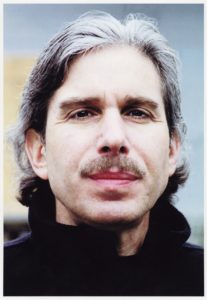
David Sutherland in 2002
Credit: Byron Smith
November 12, 2021
When documentary filmmaker David Sutherland visited Cleveland, Ohio, he did not yet know that the woman who picked him up, Elizabeth Perez, would be the focus of his documentary about deportation.
Sutherland said he had the idea to make a film about immigration and visited Cleveland frequently to spend time with members of HOLA, an immigration activist group based there. According to Sutherland, the group’s founder and executive director, Veronica Dahlberg, often sent members of the group to pick him up from the airport.
“One of the times that I flew in, she said, ‘David, if you don’t mind, I’m going to have this woman who’s an ex-Marine whose husband was deported pick you up at the airport,’” said Sutherland. “When Elizabeth Perez picked me up the first time at the airport, I noticed her car looked like it had been torn apart. Well, this was the car Marcos was driving when he got picked up. You should see what they did; they ruined the inside of that car.”
Sutherland’s documentary, “Marcos Doesn’t Live Here Anymore,” follows the story of Marcos and Elizabeth Perez and provides insight into what deportation does to families. Sutherland said that when he first met Elizabeth at the airport, it had been a year since Marcos had been deported following a traffic stop.
“I got interested in Elizabeth’s story because her husband had been deported and she was going to all these meetings and these rallies,” said Sutherland. “If I followed her, I could do a parallel action
 love story, because her husband’s in Mexico City, and she’s here, and they talk all the time.”
love story, because her husband’s in Mexico City, and she’s here, and they talk all the time.”
Sutherland calls himself a portraitist and he is known for his long-form documentary films that portray the day-to-day lives of ordinary people. He said he often spends months or years with potential subjects for his films so he can find the right stories and the people who will “go the distance” and allow themselves to be filmed over several years.
“I want you to feel like you’re living in their skin—that’s why I mic everyone that way,” said Sutherland. “You can hear them breathing and sighing from 100 yards away—even the kids, like when Pele is talking to his father on the phone.”
Sutherland said there were many benefits to filming the Perez children over the several years it took to make the documentary.
“These kids—oh my god did they grow up and become aware in just a few years,” said Sutherland.
In addition to exploring the relationship between Elizabeth and Marcos and their children as they navigate family life amidst deportation, the film also tracks Elizabeth’s unflagging efforts to bring her husband back to the United States.
Sutherland said when he began filming, he didn’t know what the outcome of the story would be. While most of his other documentaries run five or six hours, this one runs under two hours because Sutherland realized he could be filming indefinitely.
“I thought Marcos would come back, that there was a chance; we really thought that he would come back,” said Sutherland. But then I actually think that on that level, the film is quite successful. But at the end, it’s very dark, it’s still unresolved.”
Amid her efforts to bring her husband back to the United States, Elizabeth and the children attempt to live in Mexico for periods of time. Sutherland said he spent his time in Mexico and Ohio over the course of the four years of filming.
“The question is: would they remember how to live together?,” said Sutherland. “You see Marcos beg her—‘I want someone to love.’ Nothing’s ever what it appears to be.”
Sutherland said the story of the Perez family is not representative of every family that experiences the deportation, but he said that he hopes the film offers a window into what people go through.
“I am not trying to tell you what you should think, who’s good, who’s bad,” said Sutherland. “I want you to know what people facing deportation are going through. You should just be aware of what the issues are.”
Two viewings of “Marcos Doesn’t Live Here Anymore” will be offered on Tuesday, Nov. 16 at 3:30 p.m. and 7 p.m. at the Indigo Theater. Admission is free and each viewing will be followed by a Q&A with filmmaker David Sutherland.

